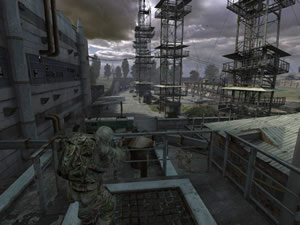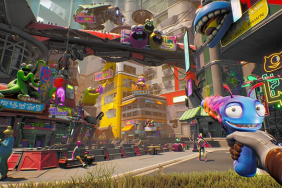Every nuclear disaster has a bright side.
E3 2004 was swarming with sequels, and while everyone was clamoring to see the
latest technical achievements of Half-Life
2, Doom 3, Black
White 2, Splinter
Cell 3 and so many other familiar names, I ran off to check out one
of the newer kids on the block – THQ’s irradiated FPS/RPG, S.T.A.L.K.E.R.:
Shadow of Chernobyl.
For the past few years, developer GSC Game World has been hard at work on a very different take on the first-person shooter genre. Set about a decade into the future, S.T.A.L.K.E.R. takes place in and around a recreated version of the infamous Chernobyl atomic power plant, the site for the worst real-life nuclear disaster the world has seen since Hiroshima. A fictitious second meltdown has left the “Zone” (Thirty square kilometers of rural and industrial land) blanketed in radiation. This, in turn, has given birth to some of the vilest mutants in gaming. It has also imbued various artifacts with strange abilities, leading many to covet these peculiar but treasured objects.
As a Stalker, your task is to penetrate the radiated Zone and procure as many artifacts as possible. The player will be offered free, open-ended exploration full of generated and scenario-imposed tasks within the eerie, atmospheric Zone. The area is populated with deadly mutant monstrosities, over a hundred other Stalkers and vigilant military factions hell-bent on seeing you dead.
Stalkers may locate artifacts with the help of anomaly detectors, but recurrent and often lethal “Blowouts” continually smother the Zone with gravitational waves, which randomly radiate more objects, thereby changing the number of artifacts. For the player caught in a Blowout, it’s serious duck-and-cover time – this ain’t your average trip to the quick-tan salon.
Returning from the Zone, you’ll be able to sell the anomalous artifacts to underground dealers and scientists in research camps on the Zone border. You can also trade with friendly Stalkers. The money is then used to purchase equipment, weapons and protective suits, allowing you to reach previously inaccessible and more heavily radiated areas. Players will sustain more than a mere allergic response to prolonged exposure to the radiated Zone, so proper protective attire is a must.
This pervasive sense of realism is one of S.T.A.L.K.E.R.‘s finest
features and is extended to its massive scale. While you’re wandering around
the expansive Zone thieving artifacts and fending off mutants,
you also must contend with the ravages of entropy. Equipment, weapons, vehicles
and your own virility will all deteriorate with use and time. This means weapon
upkeep, vehicle refueling, and even basic human needs like eating and sleeping
must be carefully managed if you wish to stay in top form. But never fear, comrade
– a swig of some Vodka will help ward off some the more minor effects of radiation
poisoning. Ura!
The realism doesn’t stop there, however. With scripted events kept to a minimum, GSC has opted to give all the creatures and characters in S.T.A.L.K.E.R. their own joys, sorrows, mannerisms and ways of reacting to different situations. The hope is that this will instill a sense of universal chaos, keeping the world random and seemingly alive. Like you and the other human characters, the mutated creatures also need to eat and sleep. You may trip over a “Pseudogiant” trying to catch some much-needed Z’s – something I would strongly advise against.
Other impressive A.I. features include how human NPCs react to you. If the player attacks and kills one of the guards, the rest will seek refuge, radio their headquarters and engage in other offensive and defensive strategies. Don’t expect these guys to stand still or blindly run out into the open.
Working in groups is not just for NPCs. Throughout the game you will be given various chances to join different Stalker factions. If you want to run in a pack, do so carefully. Very few factions are what you would call “drinking buddies” – allying yourself with one faction will inevitably brand you as an enemy with another, so choose wisely.
Arguably the most impressive aspect of the game’s realism is that you have no special abilities or insight over other Stalkers in the game. Since you all have very similar goals (meted out via the aforementioned scenario-imposed tasks), it is very possible for an NPC Stalker to complete your goal or objective before you do. More on this will have to be seen, but so far – deferring to GSC – this will lead to numerous ways to play and more than a few alternate endings. Replayability, among other things, should set S.T.A.L.K.E.R. apart from the competition.
The X-Ray graphics engine might not be as dramatic as the Source engine powering Half-Life
2, but do not take it for granted. GSC’s proprietary engine is a monster,
with all the bells and whistles you’d expect from a next-gen DirectX 9 powered
giant. Shoot a hanging light source and it casts believable illumination and
shadows in all the appropriate directions. Vehicles rock and bounce appropriately;
wood and low-density metal objects can be penetrated by high-velocity weaponry.
Explosions send loose objects like boxes, barrels, mattresses and other debris
flying about the game world with varying degrees of weight. Grass, trees, dilapidated
buildings, changes in climate, weather and water effects, object interactivity
and the sweet day/night effect are all rendered with razor-sharp detail, placing S.T.A.L.K.E.R. on
the graphical yardstick right next to the big sequels.
There is much more to S.T.A.L.K.E.R. Shadows of Chernobyl, such as several multiplayer game types, weapons/equipment functionality, mutant types/abilities and the intricacies of the RPG elements. However, some things must be left for the eventual review, which we’ll be anxiously awaiting as the next several months meltdown and the game oozes onto shelves this Fall.







